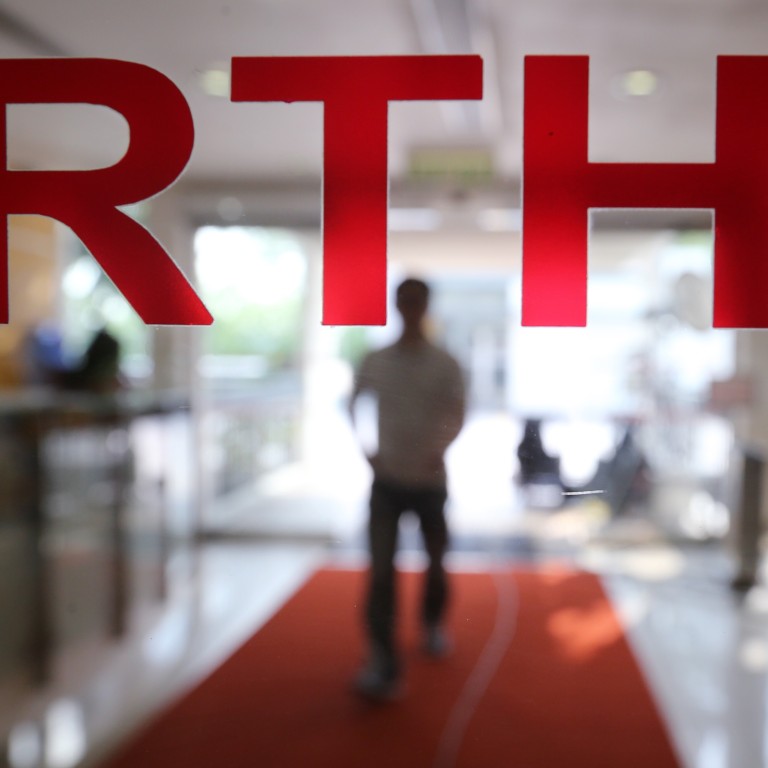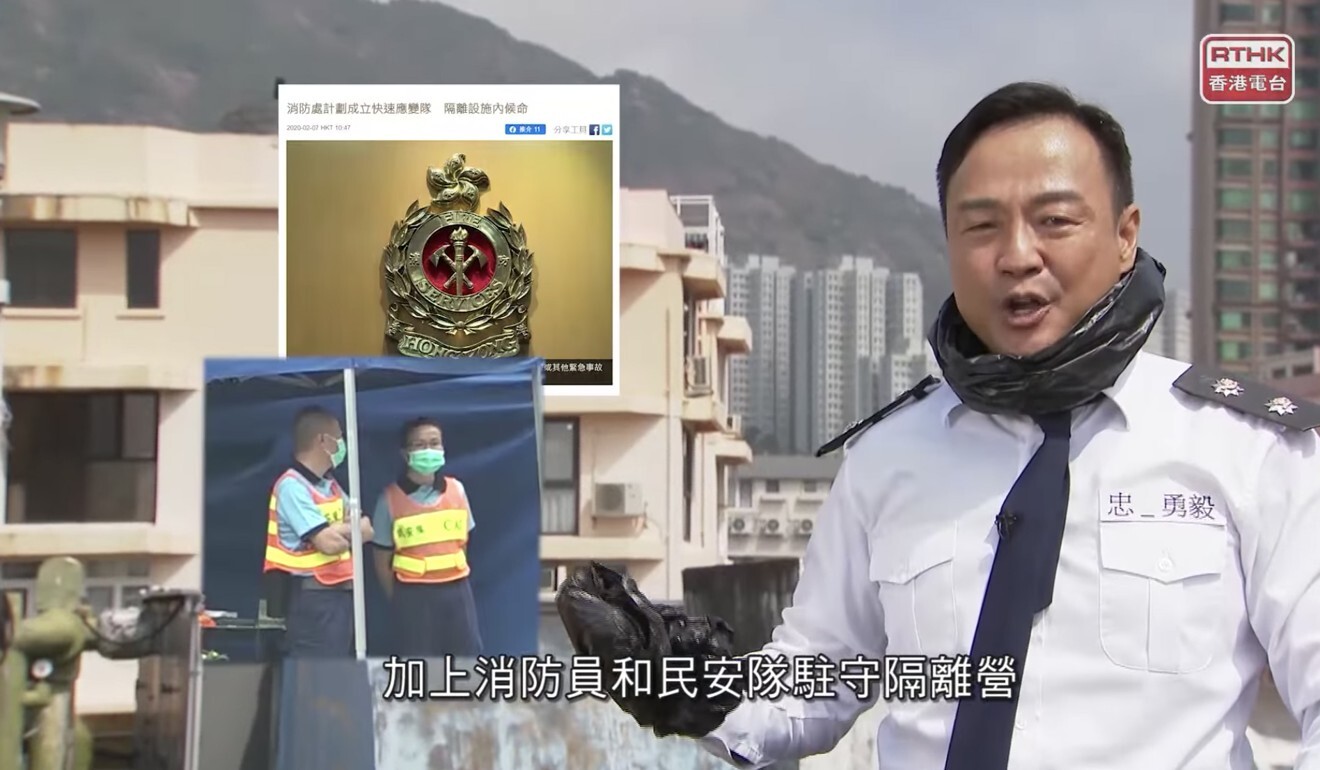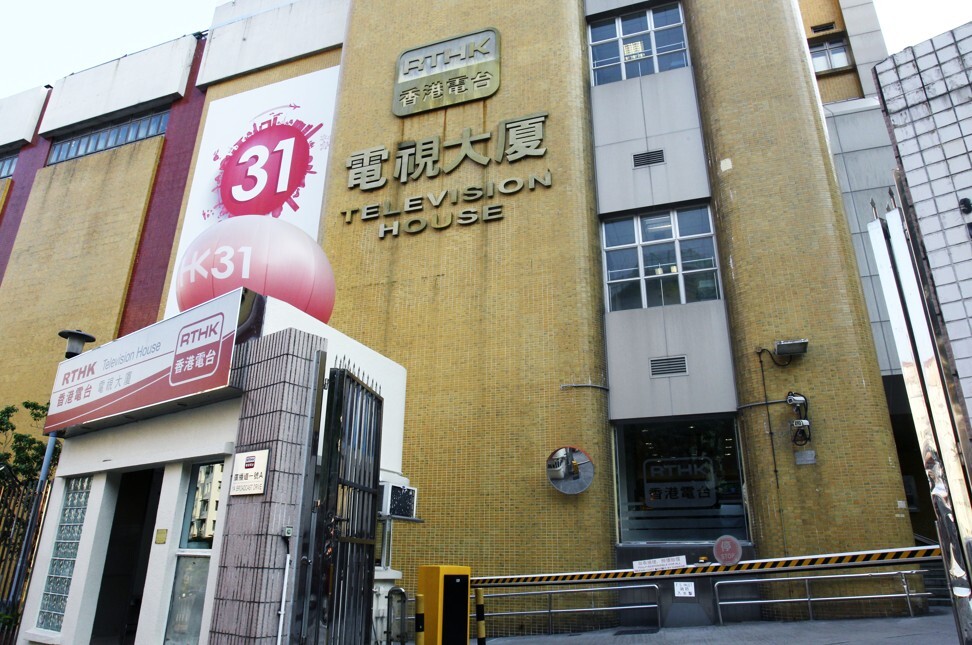
Hong Kong public broadcaster RTHK apologises to police over satirical show that portrayed officers as trash and hoarding masks
- Programme insulted force by equating it with rubbish and suggested police were keeping protective gear needed by medical staff, Communications Authority says
- Broadcaster vows to take follow-up action, but staff union chairwoman calls ruling ‘deeply unfair’
Hong Kong public broadcaster RTHK has apologised to the police after the communications watchdog ruled an episode had “denigrated and insulted” the force and was factually inaccurate.
The episode belonged to the broadcaster’s controversial Headliner political satire programme, which will be suspended when its current season ends on June 19. It portrayed police as trash and hoarding masks and other personal protective equipment at the expense of the medical sector’s more pressing needs during the coronavirus pandemic, the Communications Authority ruled on Tuesday.
Compounding the insult, the depiction of officers as rubbish was repeated in subsequent episodes, it said, calling on the broadcaster to more closely adhere to the television programme code of practice.
RTHK’s public apology came after the Commerce and Economic Development Bureau, which oversees it, told the station to take disciplinary action against staff responsible for the breaches.
We feel that the ruling is based on biased views and biased interpretation of our content
The bureau also ordered a full review of the programme production and editorial system.
The broadcaster pledged to “solemnly” take follow-up action, spokeswoman Amen Ng Man-yee said. “We will study in detail the ruling, which will also serve as a reference for programme production in the future. We offer our apology to those dissatisfied with the RTHK and to police officers who felt offended,” she said.
In a segment of the episode that aired on February 14, the host parodied an officer, with his neck and hands wrapped in rubbish bags and emerging from a large refuse bin.

Police Commissioner Chris Tang Ping-keung said the following month that he would lodge a complaint over the show. According to the authority, more than 3,300 complaints were received.
RTHK chief Leung Ka-wing had argued the programme was “non-news” and a form of satire, which “taps into hot societal topics through jocular expressions”.
The watchdog accepted the show was political satire, but said the host’s portrayal had “denigrated and insulted the police as a whole”.
“The segment’s mean characterisation of the police was deliberate with the intention, obvious to general viewers, to insult and to convey prejudice hinting that police officers were a group of people who were seen as trash, were repulsive and spurned,” the authority said. “Such characterisation also suggested that only worthless people would join the police.”
Hong Kong public broadcaster RTHK faces office crunch
The ruling noted the depiction was repeated in later episodes and said the treatment was not “incidental to a single plot or skit but an attempt to persistently promote the underlying insult and prejudice”.
The episode also suggested the force was hoarding protective medical gear while leaving other government agencies and health care workers short of masks during the Covid-19 pandemic. But the ruling noted that a media report cited by RTHK was published the day after the show aired.
The report “did not contain any reference nor provide any information or evidence to support that the police had a surplus stock of surgical masks”, the authority said. The broadcaster had implied the government made an “unfair or inappropriate” allocation of protective gear, showing bias towards the force.

A commerce bureau spokesman called the situation “very serious given that RTHK, as a public service broadcaster, has been repeatedly ruled to have breached the various provisions in the code”.
It called on the broadcaster to address concerns raised by stakeholders and take “positive and proactive follow-up actions” as well as provide an account to the public.
The authority warned RTHK last month over an episode of its Pentaprism programme that aired last November in which the host was ruled to have made “baseless, misleading, biased and partial” allegations, and incited hatred against the government and police.
RTHK Programme Staff Union chairwoman Gladys Chiu Sin-yan rejected the authority’s ruling as “deeply unfair”.
“We feel that the ruling is based on biased views and biased interpretation of our content,” said Chiu after an emergency meeting with management. She said she was assured that Headliner would not be cancelled and would return after a review.
Hong Kong broadcaster accused of breaching ‘one-China principle’
RTHK has come under fire in recent months from the government and police over coverage of the city’s ongoing social unrest. Critics claim its reporting is biased and sides with the anti-government movement.
Council Front lawmaker Claudia Mo Man-ching accused the broadcaster of bowing to political pressure and said the latest development was another blow to the city’s freedom of expression.
Pro-establishment lawmaker Leung Che-cheung, of the Democratic Alliance for the Betterment and Progress of Hong Kong, welcomed RTHK’s apology, saying it was inappropriate for a public broadcaster to produce “biased” shows. “It has nothing to do with freedom of expression,” he said. “It can produce satirical programmes as long as they are fact-based.”
A police spokesman said the force welcomed the ruling.
Help us understand what you are interested in so that we can improve SCMP and provide a better experience for you. We would like to invite you to take this five-minute survey on how you engage with SCMP and the news.


